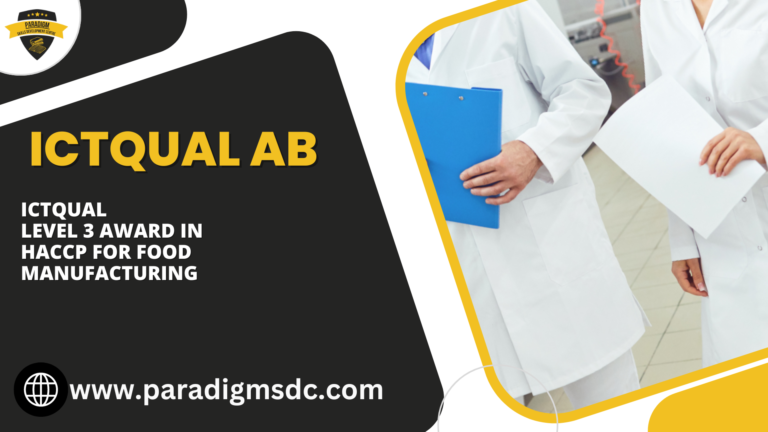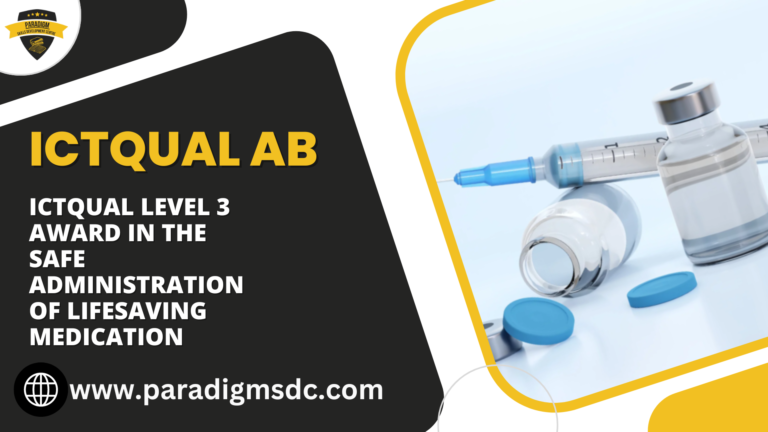Course Introduction
The ICTQual Level 3 Award in Phlebotomy is a specialized training program designed to equip individuals with the essential skills and knowledge required to perform venipunctures and other blood collection techniques safely and efficiently. This course covers the theoretical and practical aspects of phlebotomy, including patient interaction, safety protocols, and legal considerations. It is an ideal program for those seeking to start or advance their careers in the healthcare sector as phlebotomists.
Course Overview
The ICTQual Level 3 Award in Phlebotomy combines comprehensive theoretical instruction with hands-on practical training. Participants will learn about the anatomy and physiology relevant to phlebotomy, various blood collection techniques, and how to handle and process blood samples. The course also emphasizes the importance of patient care, communication, and adherence to health and safety regulations.
Course Study Units
- Anatomy and Physiology
- Equipment and Materials
- Infection Control and Health & Safety
- Patient Communication and Care
- Techniques for Venipuncture and Capillary Sampling
- Specimen Handling and Transport
- Legal and Ethical Considerations
Learning Outcomes
By the end of this course, participants will be able to:
Anatomy and Physiology
- Identify major veins used in venipuncture, including their location and accessibility.
- Explain the structure and function of veins, arteries, and capillaries relevant to blood collection procedures.
- Understand blood flow dynamics and its implications for successful venous access.
- Recognize anatomical landmarks for safe and effective venipuncture.
- Apply knowledge of circulatory system anatomy to ensure optimal blood sample collection.
Equipment and Materials
- Demonstrate proficiency in selecting and assembling appropriate phlebotomy equipment (e.g., needles, syringes, collection tubes).
- Follow proper procedures for handling and maintaining phlebotomy equipment to ensure safety and reliability.
- Describe the purpose and use of different types of needles, syringes, and collection tubes in blood collection.
- Implement safety measures when handling sharps and disposing of biohazardous materials.
- Utilize safety devices to minimize the risk of needlestick injuries during procedures.
Infection Control and Health & Safety
- Adhere to standard precautions and infection control guidelines to prevent transmission of infections during phlebotomy procedures.
- Demonstrate proper hand hygiene techniques and use of personal protective equipment (PPE) to maintain a sterile environment.
- Understand the principles of disinfection and sterilization of phlebotomy equipment and work surfaces.
- Identify potential hazards in the phlebotomy environment and take appropriate measures to mitigate risks.
- Apply health and safety protocols to protect both patients and healthcare personnel during blood collection.
Patient Communication and Care
- Communicate effectively with patients to build rapport and alleviate anxiety during phlebotomy procedures.
- Explain the phlebotomy procedure clearly to patients, addressing their questions and concerns.
- Demonstrate empathy and sensitivity towards patients of diverse backgrounds and varying levels of comfort with medical procedures.
- Adapt communication strategies to meet the needs of pediatric, elderly, and anxious patients.
- Ensure patient confidentiality and respect their privacy throughout the process of blood collection.
Techniques for Venipuncture and Capillary Sampling
- Perform venipuncture using correct technique, including patient positioning, vein selection, and needle insertion angle.
- Demonstrate proficiency in capillary blood sampling techniques such as fingerstick and heelstick.
- Handle potential complications during venipuncture, such as collapsed veins or hematoma formation.
- Apply knowledge of vein anatomy to choose appropriate veins for blood collection based on patient characteristics.
- Monitor patients for signs of adverse reactions during and after blood collection procedures.
Specimen Handling and Transport
- Label blood specimens accurately and complete requisition forms according to laboratory protocols.
- Follow guidelines for specimen storage and transportation to maintain sample integrity and ensure accurate test results.
- Understand the importance of maintaining the chain of custody for forensic and legal purposes.
- Recognize factors that may affect specimen quality and take appropriate measures to address them.
- Comply with regulatory requirements for the packaging and transport of hazardous materials, including biological specimens.
Legal and Ethical Considerations
- Explain legal responsibilities related to patient consent for blood collection and processing.
- Understand the implications of patient confidentiality and comply with relevant healthcare privacy laws (e.g., HIPAA).
- Describe ethical considerations in phlebotomy practice, including respect for patient autonomy and dignity.
- Recognize potential legal ramifications of improper specimen handling or documentation.
- Adhere to professional codes of conduct and ethical guidelines in all aspects of phlebotomy practice.
Course Benefits
- Specialized Skills: Acquire specialized skills in blood collection techniques.
- Career Opportunities: Enhance employability and career advancement opportunities in the healthcare sector.
- Practical Experience: Gain hands-on experience through practical training sessions.
- Professional Confidence: Build confidence in performing phlebotomy procedures and interacting with patients.
- Compliance Knowledge: Learn about health and safety regulations and legal considerations in phlebotomy.
Who is this Course For?
This course is ideal for:
- Individuals seeking to start a career as a phlebotomist.
- Current healthcare professionals looking to enhance their skills and knowledge in phlebotomy.
- Medical assistants, nurses, and other healthcare workers who perform blood collection as part of their duties.
- Students pursuing careers in healthcare or laboratory sciences.
Future Progression
Upon completing the ICTQual Level 3 Award in Phlebotomy, participants can further their career development by:
- Pursuing advanced certifications such as the Certified Phlebotomy Technician (CPT) or Advanced Phlebotomy Certification.
- Gaining experience and seeking higher-level positions in hospitals, clinics, or laboratories.
- Continuing education in related fields such as medical laboratory technology, nursing, or healthcare administration.
- Exploring opportunities for specialization in areas such as pediatric phlebotomy, donor phlebotomy, or forensic phlebotomy.
The ICTQual Level 3 Award in Phlebotomy provides a solid foundation for anyone looking to excel in phlebotomy. By mastering the skills and knowledge covered in this course, participants can contribute to high-quality patient care, support diagnostic processes, and advance their careers in the healthcare industry.







